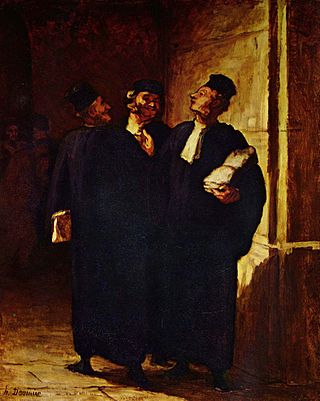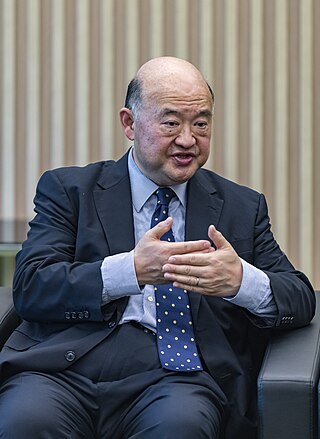
A barrister is a type of lawyer in common law jurisdictions. Barristers mostly specialize in courtroom advocacy and litigation. Their tasks include arguing cases in courts and tribunals, drafting legal pleadings, researching the law and giving legal opinions.

An advocate is a professional in the field of law. Different countries and legal systems use the term with somewhat differing meanings. The broad equivalent in many English law–based jurisdictions could be a barrister or a solicitor. However, in Scottish, Manx, South African, Italian, French, Spanish, Portuguese, Scandinavian, Polish, Israeli, South Asian and South American jurisdictions, "advocate" indicates a lawyer of superior classification.
A solicitor is a legal practitioner who traditionally deals with most of the legal matters in some jurisdictions. A person must have legally defined qualifications, which vary from one jurisdiction to another, to be described as a solicitor and enabled to practise there as such. For example, in England and Wales a solicitor is admitted to practise under the provisions of the Solicitors Act 1974. With some exceptions, practising solicitors must possess a practising certificate. There are many more solicitors than barristers in England; they undertake the general aspects of giving legal advice and conducting legal proceedings.

The Honourable Society of the Middle Temple, commonly known simply as Middle Temple, is one of the four Inns of Court entitled to call their members to the English Bar as barristers, the others being the Inner Temple, Gray's Inn and Lincoln's Inn. It is located in the wider Temple area of London, near the Royal Courts of Justice, and within the City of London. As a liberty, it functions largely as an independent local government authority.
The call to the bar is a legal term of art in most common law jurisdictions where persons must be qualified to be allowed to argue in court on behalf of another party and are then said to have been "called to the bar" or to have received "call to the bar". "The bar" is now used as a collective noun for barristers, but literally referred to the wooden barrier in old courtrooms, which separated the often crowded public area at the rear from the space near the judges reserved for those having business with the court. Barristers would sit or stand immediately behind it, facing the judge, and could use it as a table for their briefs.

Court dress comprises the style of clothes and other attire prescribed for members of courts of law. Depending on the country and jurisdiction's traditions, members of the court may wear formal robes, gowns, collars, or wigs. Within a certain country and court setting, there may be many times when the full formal dress is not used. Examples in the UK include many courts and tribunals including the Supreme Court of the United Kingdom, and sometimes trials involving children.

Barristers in England and Wales are one of the two main categories of lawyer in England and Wales, the other being solicitors. Barristers have traditionally had the role of handling cases for representation in court, both defence and prosecution.

Solicitor advocate is a hybrid status which allows a solicitor in the United Kingdom and Hong Kong to represent clients in higher courts in proceedings that were traditionally reserved for barristers. The status does not exist in most other common law jurisdictions where, for the most part, all solicitors have rights of audience in higher courts.

The Bar of Northern Ireland is the professional association of barristers for Northern Ireland, with over 600 members. It is based in the Bar Library, beside the Royal Courts of Justice in Belfast, together with the Bar Council of Northern Ireland and the Executive Council. The Executive Council has taken on many of the functions formerly exercised by the Benchers of the Inn of Court of Northern Ireland, which was established at a meeting of the Bench and Bar held on 11 January 1926.
Gregory Reginald James is a former judge of the Supreme Court of New South Wales.

The Bar of Ireland is the professional association of barristers for Ireland, with over 2,000 members. It is based in the Law Library, with premises in Dublin and Cork. It is governed by the General Council of the Bar of Ireland, commonly called the Bar Council of Ireland, which was established in 1897. The Council is composed of twenty-five members: twenty who are elected, four co-opted, and the Attorney-General, who holds office ex officio. Every year, ten members are elected for two-year terms; five by senior counsel and five by junior counsel.

Tunji Sowande was a Nigerian-born British lawyer and musician.

Geoffrey Ma Tao-li is a retired Hong Kong judge who served as the 2nd Chief Justice of the Hong Kong Court of Final Appeal—the court of last resort in Hong Kong. Between 2001 and 2010, he held various positions in the High Court of Hong Kong, including Chief Judge, Justice of Appeal, and Judge of the Court of First Instance. Before his judicial career, he was a barrister-at-law in private practice at Temple Chambers, and was qualified to practice in England and Wales, Hong Kong, Australia and Singapore.
David James Porter is a full time acting judge of the Supreme Court of Tasmania, having served as a Judge of that Court from 2008 to 2016, then as a part time acting judge from 2017 to 2024.
Clive Coleman is an English barrister turned journalist, who, from 2010 to 2020, has been the BBC News Legal Correspondent. He is also a playwright, film and sitcom writer.
Nuruddin Ahmed was an Indian lawyer and three-time mayor of Delhi. Born in 1904 in Delhi in a wealthy family to Principal Mushtaq Ahmed Zahidie, of Sadiq Eggerton College, Bhawalpur, India. He did his early education at St. Xavier's School, Delhi and completed his pre-graduate studies from St. Stephen's College. Subsequently, he did Classical Tripos from Cambridge University before studying law at the Inner Temple from where he was called to the bar. Returning to India, he started his career as a junior to Muhammad Shafi where Fakhruddin Ali Ahmed, who would later become the fifth president of India, was his colleague, and started practice at Lahore High Court. Then, he went to Delhi to continue his practice and became known for his prowess in criminal trials. He was also involved in civic administration and during his four terms as a member of the Delhi Corporation, he served as the mayor of Delhi for three terms, from 1960 to 1965. The Government of India awarded him the third highest civilian honour of the Padma Bhushan, in 1964, for his contributions to public affairs. Ameena Ahmad Ahuja, a noted artist, was his daughter. Ahmed died in 1975, at the age of 71.

QEB Hollis Whiteman is a leading set of barristers' chambers specialising in criminal, financial, and regulatory law, located in the City of London. Established in the 1980s, it employs 70 barristers, including 21 King's Counsel, four Treasury Counsel and one Standing Counsel to the RCPO. The current Heads of Chambers are Selva Ramasamy KC and Adrian Darbishire KC and the Chief Clerk is Chris Emmings.

2 Hare Court is a barristers' chambers specialising in criminal and regulatory law, located in the Inner Temple, one of the four Inns of court. Established in the 1967, It employs 77 barristers, including 23 King's Counsel and several former prosecutors, including those who have acted as First Senior, Senior and Junior Treasury Counsel – barristers appointed by the Attorney General to prosecute the most serious and complex criminal cases to come before the courts.

Satsang is a philanthropic organization founded by Sree Sree Thakur Anukulchandra. It is one of the major spiritual and cultural movements in India started in the early 20th century. Satsang was originally registered in Pabna in 1925 as a public charitable institution. However, after the Independence and partition of India, it was again registered in 1951 in the Indian Union under the Societies Registration act of 1960.
Sir Julian Bernard Knowles is a British High Court judge.











